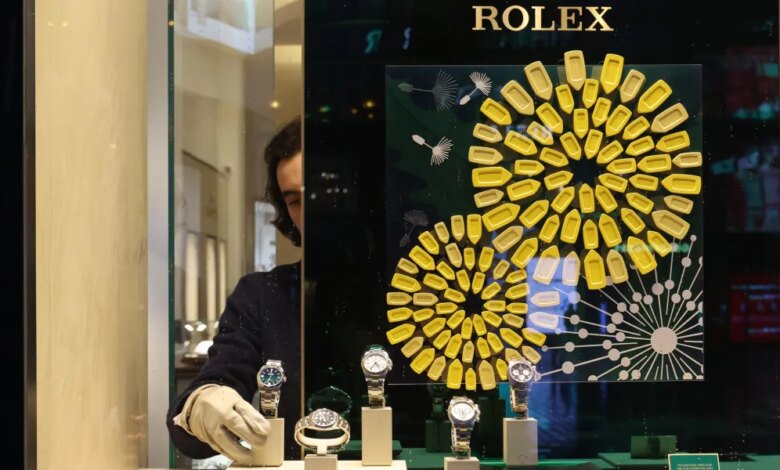Rolex CEO: Luxury watches weren’t meant to be investments


Luxury watches have long been sought after as a valuable asset. That’s why Rolex, Patek Philippe and Cartier watch prices so closely followed, as they ebb and flow with people’s appetite for high-end spending.
But that’s not how Rolex’s CEO Jean-Frédéric Dufour wants things to be. If anything, he thinks it’s risky to think of watches as investments that frequently change in value.
“I don’t like it when people compare watches with stocks. This sends the wrong message and is dangerous,” Rolex’s Dufour said in an interview with Swiss outlet NZZ earlier this month. Instead, Rolex’s watches are more akin to “products” than investments, he added.
Watches are often viewed as investments because their value can rise with time, and timepieces have followed the boom and bust seen in the broader financial markets in the past, according to Boston Consulting Group. During the COVID-19 pandemic, watch prices were surging, somewhat in tandem with the stock market highs.
When people shop for pricey watches, they often come with the mindset of purchasing an “investment piece,” Callum Patrick, the cofounder of Chronofinder, a luxury watch resale marketplace, told Fortune. Ultimately, watches are like “trophies” with a financial return attached to them—and might be products as much as they are investments.
“A luxury watch is a huge purchase, and these watches are built to last,” Patrick said. “There are ‘hot models’ that we sell day in [and] day out, and there are more niche models that you have to wait for the right collector to come along for. Both of these are worth what someone is willing to pay for it, while one is much more liquid than the other.”
Tick-tick-boom to bust for watches
Dufour’s comments come just when the world of watches has gone through a prolonged period of tumult as high interest rates and economic pressures add to shoppers’ woes. The fall in prices of luxury watches by Rolex, Patek, Audemars Piguet and others has felt especially spectacular as it followed the highs of the COVID-19 pandemic when people splurged on watch purchases.
The price tag on secondhand watches has plunged nearly 40% in the last two years, according to London-based Subdial.
Following a boom in secondhand watch demand, the Swiss watch giant began issuing certificates that mark Rolex watches’ authenticity in 2022. The next year, Rolex made another surprise move by buying watch retailer Bucherer, marking a pivot in how the top-tier watch brand will reach customers.
Despite the industry-wide slump, Rolex has remained the dominant force in the world of watches. The Swiss watchmaker raked in a record $11.5 billion in sales in 2023, up 11% from a year earlier, according to data compiled by Morgan Stanley and Swiss firm LuxeConsult published in February.
That doesn’t mean Rolex is free of troubles, though. CEO Dufour said in his interview that this year will be “challenging” as input costs are still elevated and people aren’t spending reluctantly.
“When markets weaken, as is the case now, retailers come under pressure to cut prices. This is extremely problematic because discounts damage emotional products like ours,” he said.
It’s ultimately the “very established and very powerful” brands that remain in the shoppers’ conscience and that do best amid market volatility, said Dufour.
“You can also see this from the fact that the resale value of these watches does not decrease,” he added.
Source link




